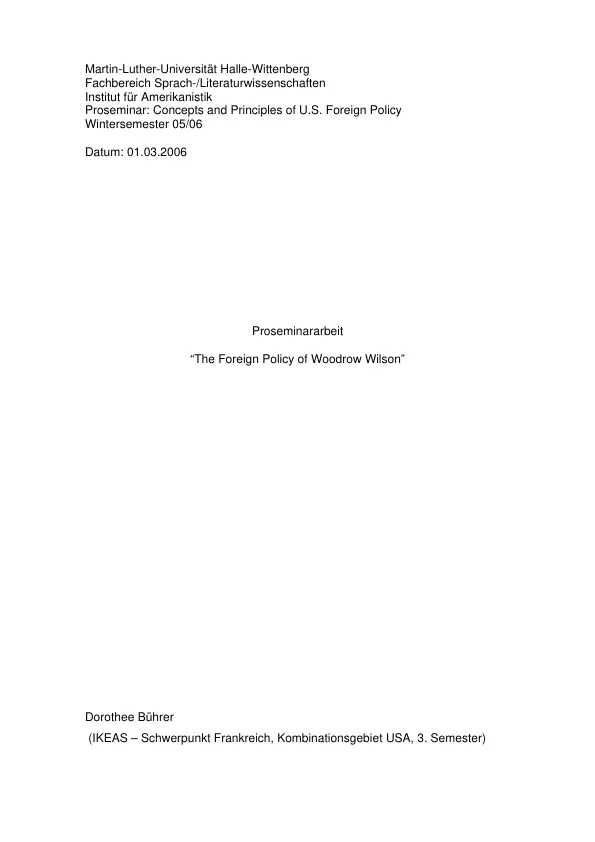Since the foundation of the United States, there were different concepts and principles in American Foreign Policy which changed throughout the centuries. While these concepts stayed relatively the same until the beginning of the 20th century, they changed rapidly during the presidency of the democrat Woodrow Wilson. He was the 28th President of the United States from 1913 to 1921 and contributed to that change in a decisive way. This paper shows which concepts and principles conducted Wilson and influenced his Foreign Policy.
To work out these concepts and principles I concentrate on two of Wilson’s speeches after having presented the basic concepts that were of importance until 1913. Both speeches are outstanding declarations of his presidency. The War Message from April 1917 describes the end of American neutrality towards the European powers. It contains key sentences like “the world must be made safe for democracy” which were often cited later on. The second key document I examine is the Fourteen Points Speech of January 1918, which became Wilson’s most famous speech. It constitutes the first statement about war aims of the Allies and therefore gives further information about Wilson’s principles. This is followed by a presentation of the principles I found in these documents completed by some aspects of the scholarly discourse as well as arguments of Wilson’s opponents.
Table of Contents
- Introduction
- Previous Principles in American Foreign Policy
- Two Key Documents of Wilson's Foreign Policy
- Wilson's War Message 1917
- The Fourteen Points Speech 1918
- Concepts and Principles of Wilson's Foreign Policy
- Arguments of Wilson's opponents
- Conclusion
- Works Cited
Objectives and Key Themes
This paper examines the concepts and principles of Woodrow Wilson's foreign policy, analyzing how his actions shifted the direction of American foreign policy in the early 20th century. The analysis focuses on two key speeches: Wilson's 1917 War Message and his 1918 Fourteen Points Speech, which provide insights into his evolving approach to international relations.
- Shifting Concepts in American Foreign Policy
- Evolution of Wilson's Foreign Policy Principles
- Analysis of Key Speeches and Documents
- The Role of American Exceptionalism in Wilson's Foreign Policy
- The Impact of World War I on American Foreign Policy
Chapter Summaries
- Introduction: This chapter provides an overview of the changing landscape of American foreign policy and its evolution during the presidency of Woodrow Wilson. The paper's objective is to analyze the specific concepts and principles that guided Wilson's foreign policy.
- Previous Principles in American Foreign Policy: This chapter explores the dominant principles in American foreign policy prior to Woodrow Wilson's presidency. It examines concepts like American Exceptionalism, Manifest Destiny, isolationism, and unilateralism, showcasing their influence on the United States' approach to international relations.
- Two Key Documents of Wilson's Foreign Policy: This chapter examines two pivotal speeches delivered by Woodrow Wilson: the 1917 War Message and the 1918 Fourteen Points Speech. These documents provide insights into Wilson's evolving foreign policy principles and his changing approach to international conflict and cooperation.
Keywords
The primary focus of this paper lies in the analysis of Woodrow Wilson's foreign policy principles and how they influenced the United States' approach to international relations. Key concepts include American Exceptionalism, isolationism, unilateralism, collective security, and the League of Nations. The analysis also explores the impact of World War I on American foreign policy and the evolution of Wilson's ideas through key documents such as his 1917 War Message and 1918 Fourteen Points Speech.
Frequently Asked Questions
How did Woodrow Wilson change American foreign policy?
Wilson shifted the US from traditional isolationism and neutrality towards a policy of collective security and making the world "safe for democracy."
What was the significance of Wilson's "Fourteen Points" speech?
Delivered in 1918, it was the first clear statement of war aims by the Allies, outlining principles for a lasting peace and the League of Nations.
What is "American Exceptionalism" in Wilson's policy?
It is the belief that the United States has a unique mission to spread liberty and democracy throughout the world.
Why did Wilson end American neutrality in 1917?
His "War Message" argued that the world must be made safe for democracy, signaling a decisive shift away from non-interventionism.
Who were the main opponents of Wilson's foreign policy?
Opponents included isolationists and unilateralists who feared that joining international organizations like the League of Nations would compromise US sovereignty.
- Quote paper
- Dorothee Bührer (Author), 2006, The foreign policy of Woodrow Wilson, Munich, GRIN Verlag, https://www.grin.com/document/88205



